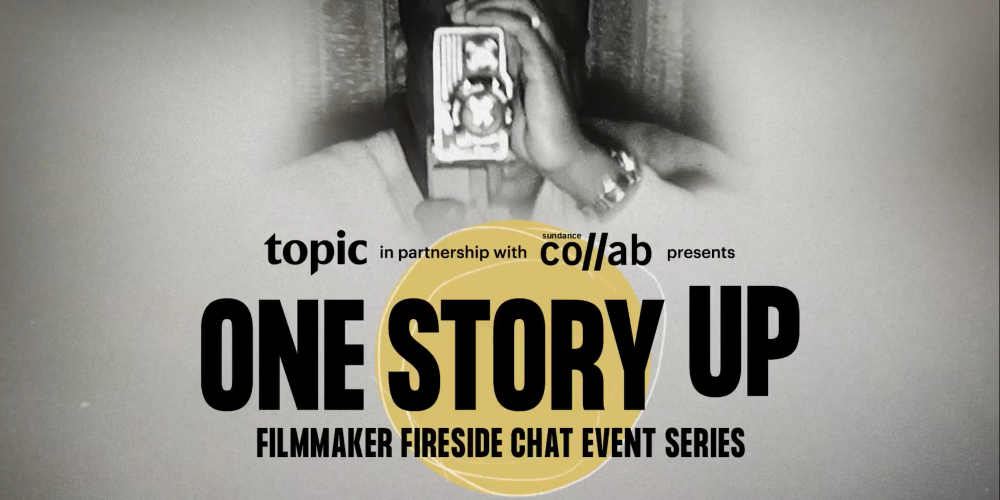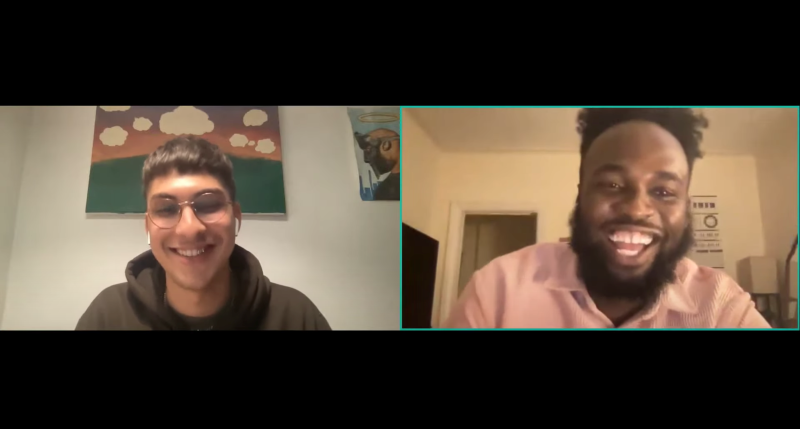"Directing Is Trusting" Emerging Filmmakers Discuss Craft in One Story Up Event

Film MFA student Adewale Olukayode and Ameer Kazmi had never met before last week, when they were brought together to participate in the online event One Story Up: Filmmaker Fireside Chat. The two young New York filmmakers discussed art and life as if they had just met at a party, excited to be sharing their passion and convictions with a fellow artist.
One Story Up: Filmmaker Fireside Chat, presented by Topic and Sundance Co//ab, is based on Roger Ross Williams’ Topic original series, One Story Up, which showcases short films from emerging artists around the world. Williams selected Olukayode and Kazmi for the ways their films overlap and speak to each other.
“Ameer uses multiple formats to question the meaning of masculinity, and the expectations that come along with it,” Williams said in his recorded opening remarks, “Adewale’s short explores the struggle of the ever-elusive American dream.”
Olukayode’s film Home follows two brothers from Nigeria working at a grocery store; one trying to work his way up while the other, chafing under the indignities that attend the uneven pursuit of the American dream, longs to get out.
Olukayode says that members of his family inspired the character of the younger brother, keeping his head down and striving even while others devalue him. Olukayode himself identifies with the brother who yearns for escape. “This [American] dream is not a dream at all,” he said, “in fact, it’s a nightmare.”
The supermarket where Olukayode shot Home was in his native Queens. Cast members were people he knew, or people he encountered: he discovered the actor who played the older brother while walking past a Nigerian mosque in Brooklyn.
Both filmmakers have drawn extensively from their lives, albeit in different ways.
Kazmi’s film Fairgrounds integrates hi-8 footage Kazmi filmed on a trip to Europe with friends, as well as digital scenes filmed later. He incorporates voiceover, layering sounds and images: contrails in the sky, a gold cube suspended amid red fabric, urban scenes and hazy lights, audio from a living room discussion.
Even for scripted or constructed scenes, Kazmi didn’t cast actors, but worked with his friends, often those whose discussions had given rise to the scenes themselves: “it was more about who I wanted to share moments with.”
Kazmi incorporated his friends’ music and poetry. The man (Nate Cox) who wordlessly climbs into a dryer in a laundromat in one scene also wrote and performed the poem which serves as the voiceover—On Genetics and Fatherless Angst. The hi-8 footage, which features young men cooking, walking around, or playing the piano, makes the intimacy of friendship central to the film. “These are still my closest friends,” Kazmi said.
Kazmi, who was just 21 when he made Fairgrounds, spoke about his film as a bookmark, a project whose making summed up and packed away the experiences of coming of age, and culminated the feeling of real life beginning.
He suggested that Olukayode’s film picks up, in a sense, where Fairgrounds left off—Home gives a sense of “trying to figure things out, almost like the other side of that coin, like now look at what I’m facing, where do I go from here.”
The two discussed their experiences setting up blocking for scenes, working with their directors of photography, and their preferred ways of working with actors.
For both filmmakers, listening, following, and being responsive in the moment is essential to directing.
“People think that directing is putting things in place, or curating it, or imagining how something’s going to come out, but I feel like it’s trying to be understanding and empathetic of any circumstance or scenario,” Kazmi said.
“As a director, people are always coming to you for answers,” Olukayode said, “sometimes you just have to pose the question out there to the world, or to your collaborators, and try to get something from them...it’s a collaborative experience where everyone has input in every small thing, and what you want to do is be that filter.”
“Directing is trusting,” Kazmi agreed, “Being able to give space as opposed to taking space...a director will nine times out of ten really make the work what it needs to be.”
“I want to pick your brain about narrative a little more,” Kazmi said, and described wanting to experiment with a traditional narrative sphere, but struggling with implementing it.
“No, you have it man,” Olukayode responded, “I write 60% of the dialogue, 40% is them. For you, you let the characters be them, you let your subjects be themselves, and half the time, that’s the battle.”
This exchange, like the rest of the evening, reflected immense mutual respect, openness, and above all, excitement about craft.
Seeing two emerging artists get into the details of process, praxis, and working philosophies was incredibly special, and, if the comments from other artists in the event chat were anything to go by, inspiring.
